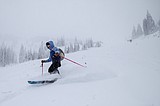Conservation license now required to access some state lands
KATE HESTON | Hagadone News Network | UPDATED 2 years, 5 months AGO
Kate Heston covers politics and natural resources for the Daily Inter Lake. She is a graduate of the University of Iowa's journalism program, previously worked as photo editor at the Daily Iowan and was a News21 fellow in Phoenix. She can be reached at [email protected] or 406-758-4459. | July 4, 2023 12:00 AM
A new rule that went into effect over the weekend requires all outdoor enthusiasts to secure a conservation license to access some state lands previously open with few restrictions to the public.
Increased use of state lands — particularly fishing access sites and wildlife management areas — has pushed up maintenance costs, according to officials with Montana Fish, Wildlife and Parks. Much of that growth in use is from people who visit the sites for outdoor recreation as opposed to angling, hunting or trapping opportunities, officials said.
By requiring a conservation license for everyone — not just for hunters or anglers — the cost of maintenance is shared by everyone, said Dillon Tabish, the state wildlife agency’s Region 1 information and education program manager. The requirement went into effect July 1.
“It takes a lot of manpower,” Tabish said. “We want to be good stewards of those sites, we want to be good neighbors and that requires us to have the funding and the resources to take care of those sites properly.”
There are more than 330 fishing access sites and 77 wildlife management sites in the state. In Region 1 there are 32 fishing access sites alone.
Approximately 50% of users at fishing access sites in Region 1 are non-anglers, meaning that they did not purchase a fishing license or a conservation license, according to the state wildlife agency.
Hunters, anglers and trappers already must buy a conservation license along with their fishing or hunting licenses. The change now requires those who use fishing access sites, wildlife management areas, wildlife habitat protection areas or legally accessible state trust lands recreationally to purchase the license as well.
Montana state parks do not require a conservation license.
The license, which costs $8 for residents, $4 for youth aged 12 to 17 and seniors 62 and older, and $10 for nonresidents, can be purchased at any Fish, Wildlife and Parks office or online at ols.fwp.mt.gov/.
On Montana state trust lands, this new conservation license requirement replaces the previously required State Lands Recreational Use License for legally accessible state trust lands that are open to the public.
A portion of the license costs — a $3.5 flat fee from each — will go to the Department of National Resources and Conservation to help fund public schools, since the department oversees school trust lands in the state.
The new law, according to Tabish, consolidates the conservation licenses needed and creates a funding source to help pay for the upkeep and maintenance of state properties.
“We understand that this is a big change, but we think it’s a good change,” Tabish said.
There has been past concern about non-anglers using fishing access sites without paying for them, according to Jim Vashro, the president of Flathead Wildlife, Inc. This change helps ensure everyone who uses a site contributes to its upkeep.
“It’s a heck of a bargain when you figure out the cost of conservation,” Vashro said. “People kind of forget what it takes to run those sites.”
It can cost up to $30,000 to replace a bathroom or build a bathroom, he said. Maintaining the sites also requires a lot of manpower, which increases the cost.
This first year of implementation will mainly be focused on education, Tabish said. Enforcement will remain similar to how it is now — game wardens will be at the sites throughout the season to check and make sure people have their license.
Beginning March 1, 2024, recreationalists that do not have their conservation license will get a written warning. On the second offense, a citation will be issued.
“This tries to level the playing field so everyone has skin in the game now and everyone is helping share the cost of maintenance,” Tabish said.
The new state law comes after Gov. Greg Gianforte signed House Bill 521 into law this May. Rep. Denley Loge, R-St. Regis, sponsored the bill in the recently concluded legislative session.
Whitefish Trail is exempt from the requirement because it is on school trust land that has a conservation easement on it. Off trail recreation in the area, however, does require a conservation license.
“I recognize that any new license is going to be met with maybe some frustration or hesitation,” Tabish said. “I understand that and I recognize that but I would say that these sites are valuable and they are important to a lot of people. We want to keep them in good shape.”
Reporter Kate Heston can be reached at [email protected] or 758-4459.
ARTICLES BY KATE HESTON

Veteran-owned mobile boat repair service anchors down in the Flathead Valley
The Kramers launched Flathead Mobile Marine to use their skills — they have decades of experience performing routine maintenance checks on a variety of boats as well as working with engines and electrical systems — and help boaters in the community.

With ski season near, resort reaches deal with staff
After 18 months of negotiations, Whitefish Mountain Resort executives and the resort’s ski patrol union are finalizing a one-year contract for the upcoming season.

Trapped in a car wreck, Woods Bay woman credits teens with saving her life
Driving home from a quilting event in Bigfork in September of last year, Carol Martin remembered that the sky was clear, the sun was shining, and she had a headache.

